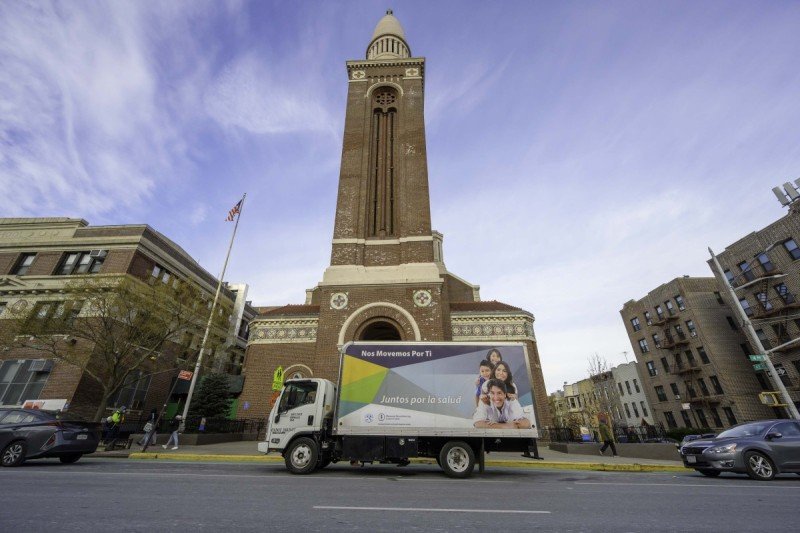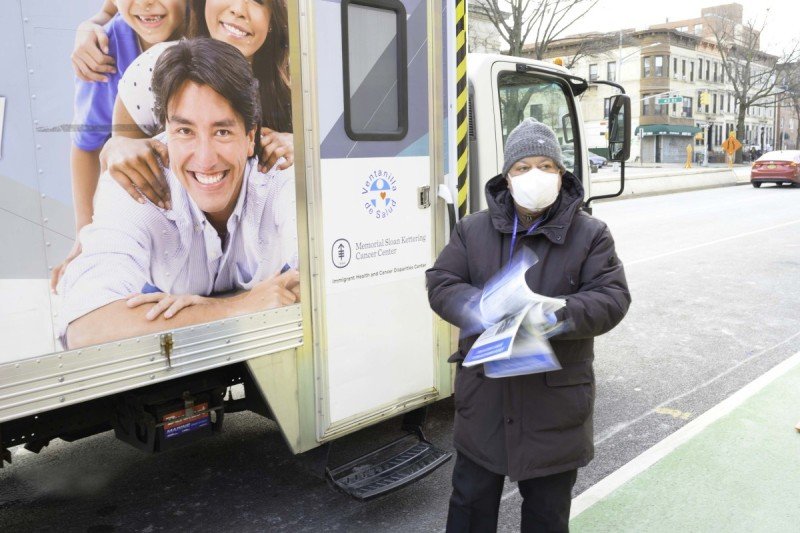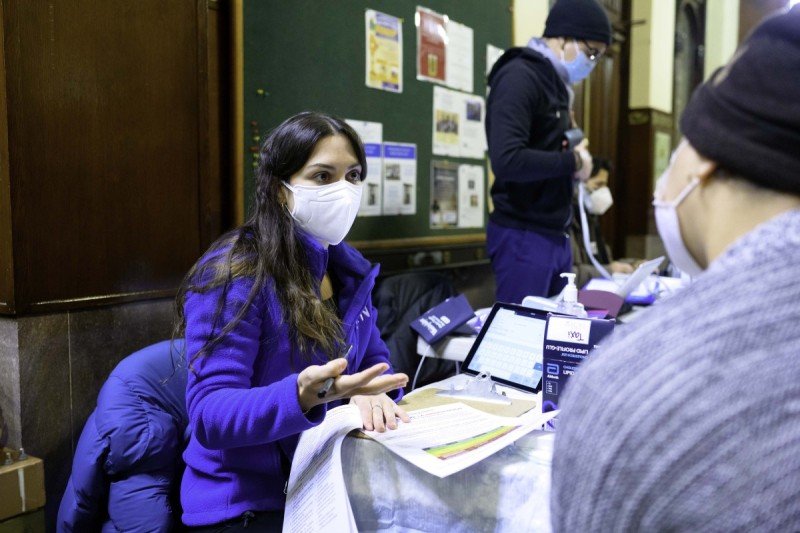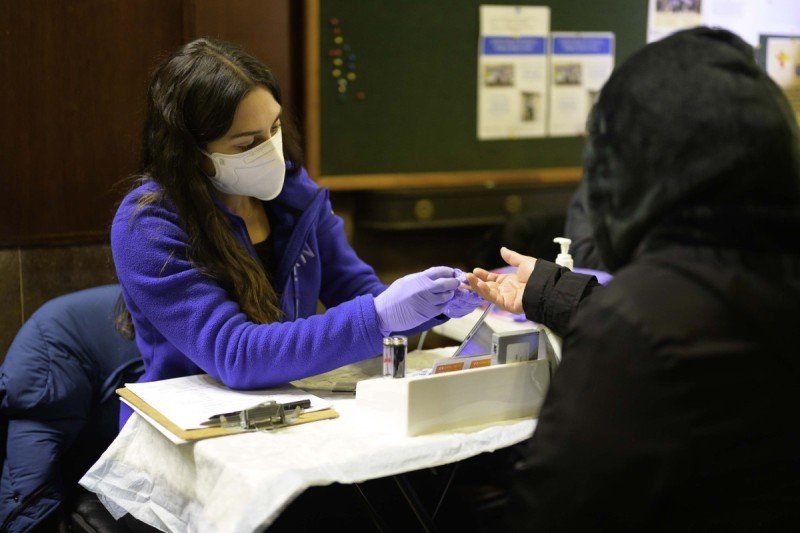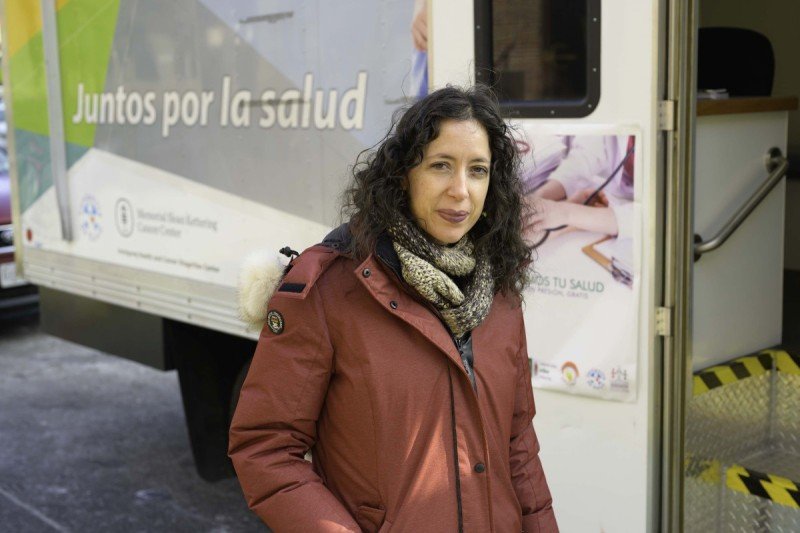Memorial Sloan Kettering’s Mobile Health Unit is a community outreach and education program from MSK’s Immigrant Health & Cancer Disparities (IHCD) Service.
Since launching in December 2021, the Mobile Health Unit has held more than 100 events across New York City’s five boroughs, served more than 1,200 community members, and developed more than 40 partnerships with community-based and faith-based organizations, social service agencies, and healthcare facilities. These partnerships have been essential to establishing a community presence and trust.
At events with the Mobile Health Unit, IHCD staff members provide general health and wellness education and offer the following services:
- Blood pressure, blood sugar, and cholesterol screenings
- Help with getting access to and understanding healthcare services
- Information about how to sign up for health insurance programs
- Tips about nutrition and healthy food choices and how to increase physical activity
- Information about cancer screening tests and help accessing them
- Education about the HPV vaccine and COVID-19 vaccine
- Expert advice for reducing cancer risk
Speaking the Same Language
One key asset of the Mobile Health Unit is that staff can communicate with residents in both English and Spanish.
Clinical research nurse Jessica Llamozas, who helps provide the clinical services offered by the Mobile Health Unit, was on-site during a Mobile Health Unit visit to a church in Sunset Park, Brooklyn in 2022. She says breaking down language barriers is one of the most important services the MHU provides.
“Engaging communities in their preferred languages helps us form a deeper connection with people and makes them comfortable sharing more information about their health and needs,” says Ms. Llamozas.
It’s also crucial for education. Team members can provide education materials and guidance — in English and Spanish — about nutrition, cardiovascular disease, and more. They also can help individuals navigate questions about health insurance, including how to access and sign up for coverage. Additionally, the Mobile Health Unit team can conduct screening procedures for general health problems. For example, they can check blood pressure, glucose, and cholesterol levels.
Timing Is Key
For community members who may have missed an essential cancer screening due to the COVID-19 pandemic, are under- or uninsured, or don’t have access to cancer screening, the MSK team provides information on how to access cancer screening, including at MSK’s Ralph Lauren Center in Harlem. To date, the Mobile Health Unit has navigated more than 100 people to cancer screening at MSK RLC.
Ms. Llamozas adds that everyone who visits the Mobile Health Unit receives a document to take home that includes their blood pressure, glucose, and cholesterol levels — and sometimes that’s the push someone needs to take the next step in getting follow-up care. For those who aren’t sure how or where to access care, the MSK team is there to help.
“We make sure they have our phone number so if they need help, they can call us,” she says.
This comfort is aided by familiarity. The Mobile Health Unit often visits the same locations repeatedly, so it becomes a regular and welcoming sight to residents. People are encouraged to bring their family members, friends, and neighbors the next time the Mobile Health Unit is in the neighborhood.
A Personal Touch
IHCD community outreach coordinator Kenneth Giron also works with the Mobile Health Unit. For him, public health work is personal.
“I come from an immigrant family and understand that being undocumented and new to the U.S. can be a very scary experience,” he says. “We want to help bridge the gap for individuals in that position so they are able to access resources, information, and services that will help them feel more secure.”
During one Mobile Health Unit visit, an elderly resident, who walked with the assistance of a cane, asked for a ride home. Mr. Giron didn’t hesitate to summon a cab for her. When she shouted to ask whether she had to pay for it, Mr. Giron waved his hand and said, “Don’t worry about it.”
Understanding a Community’s Needs
Josana Tonda is the IHCD manager of community outreach and leads the Mobile Health Unit. She came to MSK after 14 years as the director of Ventanilla de Salud (VDS), a national program overseen by the U.S.-Mexico Border Health Commission that allows the Mexican population living in the United States to access healthcare services at 49 Mexican Consulates. MSK works with VDS.
Ms. Tonda notes that the most important measure of success for an outreach program is the trust of each unique community.
“Healthcare institutions have to show each community that they are a priority, and we have to go to them rather than expect them to come to us,” Ms. Tonda says. “New York City is an incredibly diverse place, so it’s critically important to take the appropriate time and care to understand the individual needs of a community.”
Ms. Tonda estimates that close to three-quarters of the community members that her team serves require some type of navigation assistance, such as help with obtaining insurance, identification documentation, or making healthcare appointments. She recounted an occasion when the team spoke with a man who was undocumented and living in a shelter.
“We asked him if he was OK, and he replied that he was fine but needed help,” she says. “After learning more of his story, we began the process of helping him get an ID at his consulate. Having an ID will allow us to help him sign up for an insurance program and find a primary care provider,” she says.
Evidence Supports the Approach
Research has shown that mobile outreach can improve cancer screening rates in underserved communities. In a January 2022 study in the journal NPJ Breast Cancer, MSK breast cancer surgeon Virgilio Sacchini reported the effect of mobile mammogram vans on breast cancer screening rates in underserved communities.
From 2014 to 2019, more than 32,000 women across New York City had a no-cost breast screening on a mobile unit provided by the American-Italian Cancer Foundation. More than half of the participants identified as either Black or Hispanic, and more than 60% of the participants had an annual income of less than $25,000. Additionally, 30% did not have health insurance.
“Unfortunately, there are more and more data documenting differences in diagnosis and treatment among different populations,” says Dr. Sacchini. “Black, Latinx, and other communities of color have less access to cancer screening services, which can result in later diagnosis and worse outcomes.”
This initiative is funded in part by the Mother Cabrini Health Foundation, the U.S.-Mexico Border Health Commission, and the Centers for Disease Control and Prevention.
